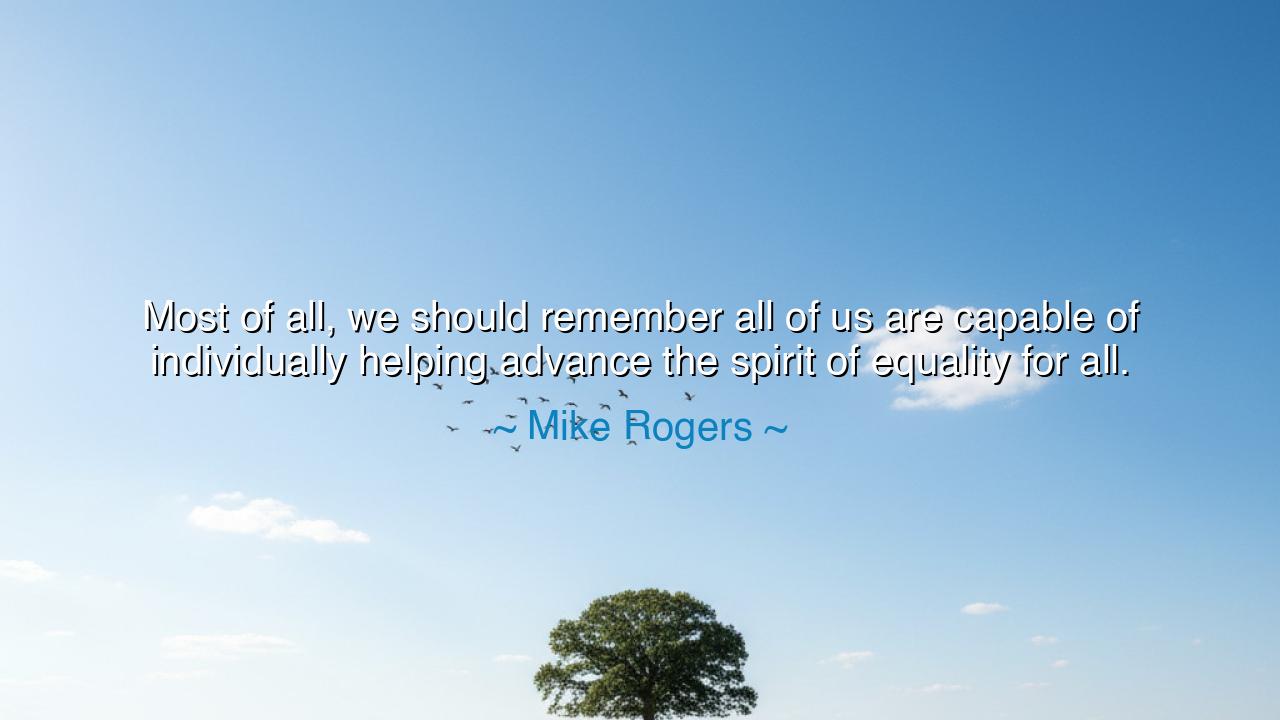
Most of all, we should remember all of us are capable of
Most of all, we should remember all of us are capable of individually helping advance the spirit of equality for all.






In the noble and enduring words of Mike Rogers, we find a truth as ancient as the human soul and as urgent as the present hour: “Most of all, we should remember all of us are capable of individually helping advance the spirit of equality for all.” These words are both gentle and mighty, a call to conscience that transcends politics, nations, and eras. They remind us that the spirit of equality—that divine idea that every soul bears the same worth before heaven and law—does not grow in the halls of government alone, but in the hearts of ordinary people. It is not the decree of kings, but the daily courage of citizens that makes justice real. Rogers speaks here not of grand revolutions, but of the quiet, unyielding power of individual responsibility—the sacred duty of each person to move the world a little closer to fairness.
The origin of this quote lies in Rogers’s lifelong advocacy for civil rights and equal opportunity. As a statesman and public servant, he saw the limitations of law when unaccompanied by compassion, and the limits of progress when citizens forget their own strength. His message is rooted in the American ideal, born from centuries of struggle and hope: that equality is not a gift bestowed, but a right upheld through participation and empathy. When Rogers calls on us to “advance the spirit of equality,” he reminds us that the work of justice is never finished. Each generation must renew it, not through speeches alone, but through actions born of conscience.
The ancients, too, understood this truth. In the teachings of Confucius, it is written that good government begins in the heart of the individual. “If there is righteousness in the heart,” he said, “there will be order in the nation.” So too does Rogers teach that great movements begin not with crowds, but with one person choosing compassion over indifference. In the same way that one candle can banish the darkness of a room, one act of courage—one defense of the voiceless, one gesture of respect—can kindle light in a weary world. The spirit of equality is not born of laws written on parchment, but of empathy written upon the human heart.
Consider the story of Rosa Parks, the quiet seamstress whose single act of defiance ignited the civil rights movement. When she refused to give up her seat on a Montgomery bus, she did not know she was making history—she was simply obeying the quiet command of dignity within her. Yet that small act, performed by one woman, helped awaken a nation to its own conscience. Rosa Parks did not have an army; she had conviction. And in that conviction, she embodied the truth of Rogers’s words: that each of us holds the power to advance equality, not through grand gestures, but through steadfast integrity.
Rogers’s message is, at its core, a challenge to the human spirit. It tells us that indifference is a betrayal of our shared humanity. To see inequality and remain silent is to permit its reign. But to act—even in small ways—is to declare allegiance to justice itself. When he speaks of “helping advance the spirit of equality,” he is not merely speaking of law or politics; he speaks of the daily choices that shape the moral fabric of society. When we listen to another’s pain, when we speak truth against prejudice, when we lift someone who has fallen, we breathe life into that sacred spirit.
And yet, his words also carry humility. He does not demand perfection; he calls for effort. “All of us are capable,” he says—reminding us that the work of equality belongs not to saints or heroes alone, but to every human soul willing to try. The teacher in her classroom, shaping minds with kindness; the worker who stands up for fairness; the neighbor who offers dignity instead of judgment—these are the quiet architects of equality. The spirit of equality is not advanced in great leaps, but in the steady footsteps of those who refuse to give up on goodness.
The lesson, then, is both simple and profound: never underestimate the power of one heart awakened to justice. We are all bearers of this torch, and the flame passes from hand to hand. Do not wait for others to act—act yourself. Look upon the world and ask, “What can I do, in this moment, to make it fairer?” Let your compassion become your rebellion against cruelty; let your empathy become your revolution. For the walls of injustice are not toppled by hatred, but by the steady blows of love and courage.
So let this truth be carried forward, as a sacred inheritance for all generations: the fight for equality is not the work of a few—it is the destiny of all. When each person dares to believe in their own power to do good, the world is changed, not by decree, but by example. As Mike Rogers reminds us, the future is built not by the mighty, but by the mindful; not by the few, but by the many who choose compassion over comfort, and courage over silence. For when the spirit of equality burns in every heart, no darkness—no injustice—can endure.






AAdministratorAdministrator
Welcome, honored guests. Please leave a comment, we will respond soon